Swiss EGOI Delegation
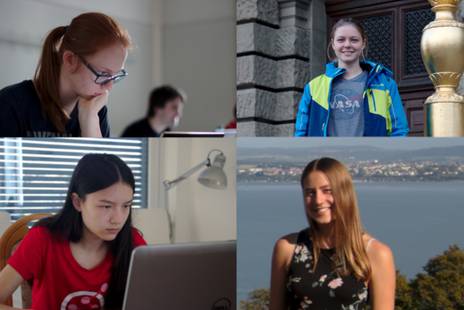
In the run-up to EGOI qualifications, I’ve had the pleasure of meeting and chatting with the contenders for this year’s Swiss team. These brilliant young women are the next generation of role models in a field that to this day remains male-dominated. Confident, courageous and unique, they are challenging themselves and the status quo and proving that “girls can do anything”.
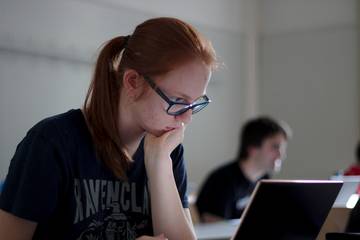
Priska Steinebrunner
There could not have been a better first interviewee than Priska to help me ease into this series of dialogues. Her energy and openness instantly dissolve any barriers, and the best description of our conversation just so happens to be a translation of her name: delightful.
Priska’s hobbies include learning the piano, writing fiction stories, and spending much of her time improving her programming skills. She started out as a beginner in the previous years’ edition and made her way to a bronze medal in the finals of the Swiss Olympiad in Informatics (SOI). Although she modestly attributes her success to “a bit more luck than just ability”, this year she is once again strode past the first round and into the camp.
Priska was fascinated with computers and thee people who could perform the magic of controlling them. “But I never really realized that it’s something I can do as well”, she says. Her first encounter with programming was in school, learning Python. Nudged by their informatics teacher, her entire class took part in the “Informatik Biber” competition. Her outstanding performance prompted further encouragement to take part in SOI. “I’ve learned a lot, there’s still a lot of magic with computers but the SOI stuff now I think I can do”. Learning to trust her abilities was a year-long journey. “It was sometimes difficult to just have the feeling you can do it. I guess the whole SOI year I felt like a total beginner, everyone knows more than me and so on”. With every new achievement, every round and camp she qualified for, both her programming skills and her confidence grew. Getting into the Sarnen camp after the first round, scoring enough points in the second round to go to the finalists’ camp and then the finals: these moments have been highlights of her journey. Her landslide to the finals last year came as a complete surprise, culminating with her proudest achievement: a full score on one of the finals tasks that only a couple others also managed to solve. Finally, at the end of the competition year, during the Girls Camp, the realization set in that “I don’t feel like a beginner anymore and that’s a nice feeling”.
She continues to raise the bar for herself. Her approach to solving the tasks this year is more logical and structured, a reflection of the progress she’s made. Her expectations of herself have also increased. “I guess this year will be different because maybe I do put more pressure on myself. You’re always getting better and better, and always having somebody who is still better than you. I know I can do it, so I’m just trying my best to get as far as possible. It’s a learning process and learning always has challenges”.
There’s nothing you can’t do when you try it. Something you never thought you could do, a year later it can be your biggest hobby.
The SOI volunteers’ support was paramount in surpassing these challenges. With their patience, encouragement and positive attitude, they make everyone feel that progress is within reach, regardless of their individual level. Along with gratitude and appreciation for the volunteers, Priska acknowledges them as role models. They not only pass on their knowledge, but also inspire her to find her own way and be her unique self. She considers this to be one of the most personally valuable lessons from the SOI experience. “The other important thing is realizing there’s nothing you can’t do when you try it. Something you never thought you could do, a year later it can be your biggest hobby”.
There are two sides to what makes SOI special for Priska. On one hand, the intellectual stimulation of finding solutions to challenging tasks. She lights up when she talks about solving coding problems, the joy and satisfaction of getting a full score after spending hours tinkering and debugging your code. “And the other thing is the contact with the other girls. These are people I don’t normally see or meet, it’s just nice being with them, and so I love the camps. And debugging is more fun when you’re together.” She would encourage more girls to explore programming and SOI, and discover their talents and passion. “Just try it, it’s fun, and it might be something for you. You can’t know if you don’t try it”.
What does the future hold for Priska? Her next goal is participating in EGOI. And after that, she hopes to qualify for the International Olympiad in Informatics (IOI) one day. She considers that her wildest goal - out of so many excellent participants, only four qualify each year. “I don’t know if this goal is maybe a bit too high, but I will see… And at least I’ve tried. I’m not a person who sets low goals, I’ve always asked a lot of myself, and I’m always trying hard”.
Later on, she has her sights set on studying informatics at ETH and continuing to dive into the magical world of computers. She’s also eager to travel abroad. Priska is well on her way to achieving her dreams and her SOI experience has taught her a valuable life lesson early on, one that will keep her going and doing her best: Just try it. You can do anything.
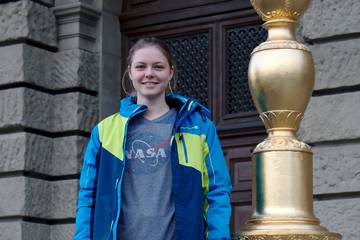
Ema Skottova
Ema’s story starts as one of contrasts and of challenging stereotypes. She is an athlete as well as a seasoned and accomplished (Science) Olympian, having won a bronze medal at the European Girls’ Mathematical Olympiad and a silver one at the Swiss Olympiad in Informatics last year alone. “Especially when they [people] get to know me as the girl who plays soccer, and then they hear that I also do maths and computer science, they sometimes get confused”. This year, she has her sights set on closing the few points’ gap that kept her from the International Olympiad in Informatics in 2020. Her goal is to be part of the Swiss delegation at both EGOI and IOI.
Guided by innate talent and enjoyment for mathematics, Ema found her way to SOI by first participating in the Mathematics Olympiad. The experience appealed to her, so she set out to find other Olympiads she could participate in. “[…] I found out about informatics. I had been programming a bit in my free time already, so I thought I’d try it”. Mathematics is also what continues to fuel her programming exploits “I really enjoy maths and I see programming as an application of it, it’s like the closest thing that could be useful for everyday problems. I also like the potential that programming, or just technology in general, has for the future”, along with the puzzle-solving aspect that comes up during the Olympiad.
I really enjoy maths and I see programming as an application of it. I also like the potential that programming has for the future.
When first starting out in SOI, she was able to rely on her already rich mathematics knowledge to help her along: “In the beginning it wasn’t very hard to find the solutions to the problems, just because they are quite mathematical, or they require a lot of logic, and I had trained that”. However, it wasn’t all effortless. A few missing pieces were standing between her and her desired performance. “I knew which algorithm to use, but I didn’t know every detail of how to write that algorithm down. So in the first year, before every competition, I was really scared that I would solve a problem in my head, but then I wouldn’t know how to program it”. After the first year, as her programming skills improved, it all started to come together. Her confidence also saw a large shift, which she considers to be the biggest general improvement, as well as an accurate indicator of her progress over time.
The challenges of SOI go beyond programming. Ema admits, laughing, that her biggest challenge was in fact “getting used to really struggling with the things I thought I was good at and getting used to asking for help”. At the same time, this helped her get a glimpse of the world outside the classroom and put her abilities into perspective. “If you’re just at the top of your class, and you know there’s twenty people there, you never really know how much that means outside the class”. As a result, she learned to focus on her individual progress and avoid comparison: “I feel like you can see much more progress if you only look at yourself, and it has been very helpful”.
The highlights of her SOI experience are the people and the community. She appreciates the atmosphere of camaraderie that the shared enthusiasm for informatics creates. The volunteers serve as role models to the participants, and the other participants feel like friends rather than competitors to Ema. To encourage more girls to participate, she would say “[…] definitely try it, and also don’t give up if it doesn’t work from the beginning […] you can participate another year, at least you’ve learned a lot, and you’ve met a few people”. She points out that the only prerequisite is interest; prior knowledge is not required and the preparation events that the SOI team diligently puts together each year do a great job of teaching all the basics one would need for the competition.
She’ll be off on a new adventure next year, as she finishes high school. What does she hope the next years to bring? “I’d like to study maths. I don’t think I have a specific goal, but I would like to make a small difference with maths somehow.(…) maybe just proving some small thing that no one has proven before, it might be completely insignificant but I’d really like that, or I’ve been considering teaching maths as well, helping students who felt they couldn’t do maths understand that it’s not that bad”. I truly hope teaching will find a place in Ema’s future. Her talent, passion, her outstanding achievements, and the lessons she takes away from her SOI journey are an inspiration.
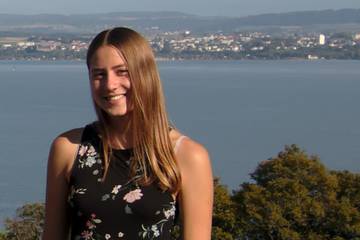
Jasmin Studer
The thread throughout our conversation is Jasmin’s tangible, genuine keenness for the Informatics Olympiad. Each account of her experiences is accompanied by a heartfelt smile. A first year participant, Jasmin was introduced to Informatics last summer during a programming course at school, followed by the Girls Camp of the Swiss Olympiad in Informatics. These experiences helped her realize that she enjoyed coding, but she was still reluctant to participate in the first round. Her father’s encouragement tipped the balance, and she is delighted with how things turned out: “I really enjoy it, the people are so nice, and I love the tasks!”
At first, Jasmin was concerned about how she would be able to rise up to the other participants’ level. Once at SOI, she discovered that rather than feeling intimidated, she felt very much encouraged and inspired. The more experienced, knowledgeable participants were very eager to support the newcomers: “In the camp and at the workshops they helped a lot, people help each other and discuss the tasks”. She’s performed very well so far, finishing the first round in the top 20 and qualifying not only for the second round, but also for the preparation camp that precedes it. Taking part in this intensive training week boosts participants’ chances of successfully completing the second round. Despite finding some tasks difficult compared to her previous experience in the junior round, she thinks that the SOI organizers do a great job preparing participants for the competition.
It doesn’t matter if you don’t know much about it, you can learn.
Regarding her progress, she thinks it most strongly shows in her ability to find and optimize solutions. “I can see when a program is too slow, and I learned a way of thinking to find algorithms”, she says. Despite having only the weekends to practice and prepare for SOI, the problems are often at the back of her mind as she goes about her daily schedule and activities. It’s not uncommon for her to have a sudden breakthrough while she’s engaged in a different activity. Jasmin deeply appreciates and enjoys the community aspect of SOI, the friendly atmosphere that facilitates new friendships. “Getting to know people with similar interests” comes up as an important motivator, and her favourite part of the experience. She is very much of the opinion that role models are an important element for girls to feel motivated to participate. Jasmin herself would like to assume a training role later on, once she can’t participate anymore. There are valuable lessons to be learned from the SOI volunteers that extend far beyond coding skills. They model continuous learning at every stage among participants who might otherwise feel overwhelmed, or insecure about their abilities. Seeing that anyone, no matter how knowledgeable, can still ask for help sometimes, is reassuring to beginners. “It shows me that even they can’t do everything just right away, so it’s a bit relieving”. Drawing inspiration from her dad’s words of encouragement when she worried she might not be “good enough”, as well as from her experience since, she wants other girls who might be holding back from participating to know that “the people are very nice and help you, and it doesn’t matter if you don’t know much about it, you can learn”.
As for her most ambitious goal at the moment, Jasmin says “It would be great if I could one year go to the finals”. She doesn’t fully trust that she can accomplish that just yet, but by witnessing her own improvement and that of others, she realizes that the people who are now making it to the final all started in a similar place as she did. Given her remarkable accomplishments so far, a place in the final may be closer for Jasmin than she dares to expect. Although she has two more years ahead of her to decide, the Olympic experience has already inspired her future plans. “I think I’d like to go in the direction of maths or informatics, but I’m not sure yet”.
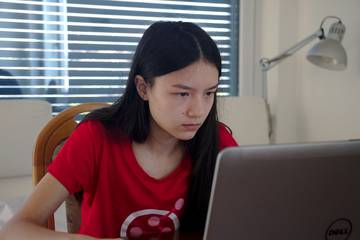
Vivienne Burckhardt
As she joins our meeting, I realize that I‘ve already met Vivienne, in a way; her picture accompies the announcement for the start of the EGOI selection process. She participated in the Junior Round of the Informatics Olympiad this year, as she is one of the youngest participants.
How did her SOI journey start? It was actually her brother, a former SOI contestant and now volunteer, who motivated her to participate for the first time. Although she was a bit skeptical in the beginning, she went to the workshops and was able to solve enough tasks in the first round to qualify for the week-long SOI camp.
In general, she really enjoys camps. They are an opportunity for not only intense training, but also for social interactions and connecting with like-minded young people. “All in all I feel like SOI is less competitive than one may think it is. I mean, it is a competition after all. But it‘s not just about that”, she explains, “it‘s about doing your best and motivating others to do their best.” Instead of comparing yourself to them, doing your best at your current level is what counts. She cherishes the feeling of community, collaboration and support that this environment creates. In fact one of her favourite moments about camps are game nights in the evening and outdoor sports played during breaks. This has allowed her to build close friendships with other participants and to stay connected, despite the reduced in-person contact during the past year.
Since the pandemic started, she virtually meets with volunteers and participants to play online games as a way to counteract social distancing. Unfortunately, the yearly winter camp that usually takes place in Sarnen had to be held online this year. “It was a totally different experience”, she explains, “but I still really liked it and I learned a lot. The socializing, was of course, a bit harder, but I think it was one of the best camps that could’ve been held in the current situation.”
Vivienne has found that a big challenge is staying motivated. Some days it’s harder to show up and do the work, to tirelessly chase small improvements that precede the big leaps. She admits that it can take many hours, sometimes even days to solve a task. She proceeds to explain that the debugging process often takes a lot longer than the initial writing of the code. But the longer it takes to solve a problem, the more rewarding it is in the end. “Sometimes you think you can‘t solve it after reading the task description, or when you put a lot of time and energy into it, it feels great when your solution finally gets accepted.”
She mentions that the motivation comes in waves for her. “After an SOI event I‘m usually very motivated to keep training, but then it goes down again, sometimes I just find it hard to stay motivated.” Occasionally she just has to force herself to code; she finds that after that, her motivation usually comes back. She also finds motivation in being around more advanced participants, particularly in acknowledging their progress over time and using that as an inspiration and a reminder of her own potential for growth, learning and improvement. She also reminds herself of her goals. This year in particular, her main goal is EGOI.
Even if a problem may look very hard, you can still think logically about what should be done or how you can try to solve it. I think that‘s a valuable lesson
In her eyes, the benefits of participating in SOI go beyond informatics. Participants train logical thinking and problem-solving skills, learn to integrate knowledge and apply it in different ways to solve various problems, and find solutions on their own, rather than by rote memorization. “Even if a problem may look very hard, you can still think logically about what should be done or how you can try to solve it. I think that‘s a valuable lesson.”
Her words of encouragement for other girls who are thinking about taking part in SOI are: “Just go for it, give it a try. Nothing bad could happen, so there‘s really no reason not to. Once you start, you find more motivation to keep improving, and it‘s satisfying to look back and realize your progress by comparing what you found hard a year ago to what you can do today.” As a beginner, the learning curve is incredibly steep and progress is quickly noticeable.
Although this is only her second year participating and she admits to having a long way to go, she keeps a grounded and focused attitude, approaching her goals one step at a time.
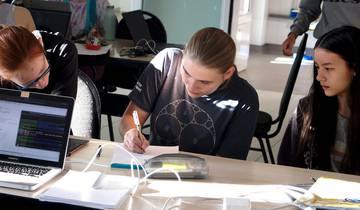
EGOI
The European Girls’ Olympiad in Informatics (EGOI) will take place for the first time from June 13 to 19, 2021. Launched by volunteers of the Swiss Olympiad in Informatics (SOI), EGOI aims to encourage young women with an interest in informatics. The event is planned in a hybrid format, with some delegations traveling to Zurich while others participate online.
In connection with EGOI, the “IT Feuer” campaign will take place from May 10 to June 11, 2021 to raise public awareness of the relevance of IT and its many opportunities for young talents.
About the author: Ioana Gasler has a background in neuroscience research and is passionate about science education.